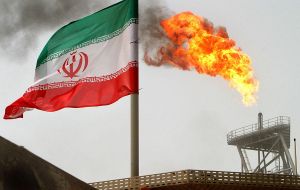MercoPress. South Atlantic News Agency
Iran negotiations, OPEC meeting loom for oil markets
 “We will witness the sanctions shattering in the coming months,” Rouhani announced to a crowd in Teheran during a political rally
“We will witness the sanctions shattering in the coming months,” Rouhani announced to a crowd in Teheran during a political rally  “We're very keen to try to get to a deal, but not a deal at any price,” UK Foreign Secretary Philip Hammond said
“We're very keen to try to get to a deal, but not a deal at any price,” UK Foreign Secretary Philip Hammond said  Prices have gone down more than 30% from just a few months ago and Iran needs somewhere around 135 dollars per barrel for its budget to breakeven
Prices have gone down more than 30% from just a few months ago and Iran needs somewhere around 135 dollars per barrel for its budget to breakeven As November draws to a close, there are two major events that could profoundly change the oil markets. With the clock ticking, the 5 permanent members of the UN Security Council plus Germany (P5 plus 1) are negotiating down to the wire with Iran over its nuclear program.
The two sides have made substantial progress, but some difficult issues remain unsolved ahead of the November 24 deadline.
“We're very keen to try to get to a deal, but not a deal at any price,” UK Foreign Secretary Philip Hammond said on November 17. “There will have to be very significant further movement by the Iranians if we're going to be able to get to a deal.”
Both sides have approached negotiations with seriousness and with the intention to actually resolve their differences, according to officials involved in the process. Iran has signaled its willingness to accept international inspections of its nuclear program and the possibility of receiving enriched uranium from abroad. In exchange the U.S. has suggested Iran could maintain some domestic ability to enrich uranium.
Outstanding issues center on the pace at which the U.S. would lift sanctions as well as the exact details of Iran's enrichment capability. With only days left until a deadline, a deal is highly uncertain. Over at Quartz, Steve LeVine writes that the stakes are high, with either a diplomatic breakthrough or a major collapse in negotiations as the two most likely outcomes.
He says a deal is more likely than not due to the enormous financial pressure Iran is experiencing because of falling oil prices. With prices down more than 30% from just a few months ago, and Iran needing somewhere around 135 dollars per barrel for its budget to breakeven, it would be the biggest beneficiary of a diplomatic accord with the west.
Not only that, but the Iranian government has also raised expectations of a deal. It has received foreign business delegations, highlighting the investment opportunities in Iran once sanctions are removed. There is potential for carmakers, mining companies, and financial institutions to expand into Iran if it opens up. BP and the French oil company Total recently said that they would be interested in going back into Iran if sanctions are lifted and the Iranian government offers favorable terms.
Earlier this year, Iranian President Hassan Rouhani promised that the sanctions regime would soon be lifted. “With your support, this government has taken the first steps towards the lifting of the brutal sanctions ... We will witness the sanctions shattering in the coming months,” Rouhani told a crowd in April, according to Reuters. Talk of the pending economic benefits of a deal could make it difficult for Iran to back off.
And sanctions have taken their toll. Iran's oil exports have more than halved from their pre-sanctions level of about 2.5 million barrels per day. As a result, Iran's GDP fell by 5.8% in 2012, the year that tough western sanctions took effect.
Hardliners in both countries could work to prevent a deal. But in Iran, even among the most conservative, there may not be aggressive opposition to a deal in principle, reports The Economist.
While far from certain, a deal could see the return of several million barrels per day of Iranian oil production, although at a gradual pace.
While nuclear negotiations reach the finish line, a second event is set to take place – OPEC's meeting in Vienna on November 27 to decide its oil production target. There has been much speculation, but little hint at what the cartel will do. There has been a flurry of diplomatic activity behind the scenes in the last few weeks as OPEC members plead their case with Saudi Arabia to cut back production. Libya's Prime Minister visited Riyadh on November 13, arriving just as Iraq's President departed.
Saudi Arabia has thus far showed no willingness to cut production, with officials earlier this month suggesting they would only act if oil prices dropped to around $70 per barrel. At the time, OPEC officials thought that was unlikely, but with Brent crude dropping below $80 on November 17 on news that Japan fell into recession, pressure is mounting on Riyadh to act.
There is a high degree of uncertainty over how the Iranian negotiations and the OPEC meeting will play out, but the end of November will be hugely important for energy markets.
By Nick Cunningham of Oilprice.com




Top Comments
Disclaimer & comment rules-

Read all commentsThe ragheads are liars.
Nov 21st, 2014 - 06:10 pm 0Whatever they say will be a lie, just like TDC.
Commenting for this story is now closed.
If you have a Facebook account, become a fan and comment on our Facebook Page!